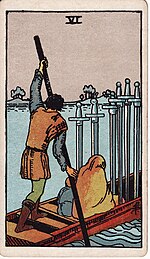
The Six of Swords is a card used in Latin-suited playing cards which include tarot decks. It is part of what tarot card readers call the " Minor Arcana".
Tarot cards are used throughout much of Europe to play tarot card games. [1] In English-speaking countries, where the games are largely unknown, tarot cards came to be utilized primarily for divinatory purposes. [1] [2]
Symbolism
The card is sometimes seen as depicting the Slough of Despond from The Pilgrim's Progress. Upright it can mean: gradual change, movement, or travel away from difficulty or imminent danger; the solution of current problems; long journeys and passage from pain; or obstacles which are overcome. It may also be a suggestion of interpenetrating worlds, and changing channels from one set of perceptions to another. [3]
References
- ^ a b Dummett, Michael (1980). The Game of Tarot. Gerald Duckworth and Company Ltd. ISBN 0-7156-1014-7.
- ^ Huson, Paul, (2004) Mystical Origins of the Tarot: From Ancient Roots to Modern Usage, Vermont: Destiny Books, ISBN 0-89281-190-0 Mystical Origins of the Tarot Archived 2007-09-27 at the Wayback Machine
- ^ Eric Ganther and Stevee Postman, (1998) The Cosmic Tribe Tarot, Vermont: Destiny Books, ISBN 0-89281-700-3, pp.78-79

The Six of Swords is a card used in Latin-suited playing cards which include tarot decks. It is part of what tarot card readers call the " Minor Arcana".
Tarot cards are used throughout much of Europe to play tarot card games. [1] In English-speaking countries, where the games are largely unknown, tarot cards came to be utilized primarily for divinatory purposes. [1] [2]
Symbolism
The card is sometimes seen as depicting the Slough of Despond from The Pilgrim's Progress. Upright it can mean: gradual change, movement, or travel away from difficulty or imminent danger; the solution of current problems; long journeys and passage from pain; or obstacles which are overcome. It may also be a suggestion of interpenetrating worlds, and changing channels from one set of perceptions to another. [3]
References
- ^ a b Dummett, Michael (1980). The Game of Tarot. Gerald Duckworth and Company Ltd. ISBN 0-7156-1014-7.
- ^ Huson, Paul, (2004) Mystical Origins of the Tarot: From Ancient Roots to Modern Usage, Vermont: Destiny Books, ISBN 0-89281-190-0 Mystical Origins of the Tarot Archived 2007-09-27 at the Wayback Machine
- ^ Eric Ganther and Stevee Postman, (1998) The Cosmic Tribe Tarot, Vermont: Destiny Books, ISBN 0-89281-700-3, pp.78-79